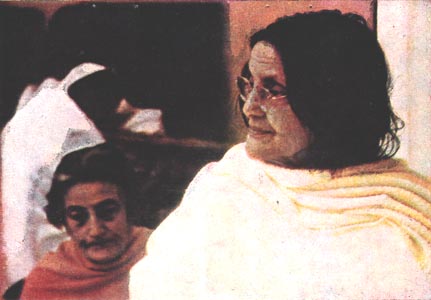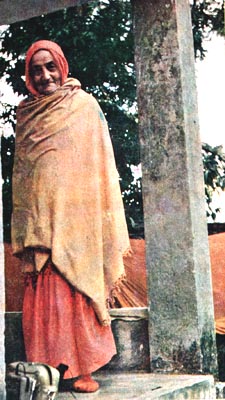
Blanka and Sri Sri Ma Anandamayi
Atmananda—Recollections of Her Earlier Days
Elise
Barnett (New York)
Atmananda was born on June 7th, 1904 in
Vienna, the capital of the Austrian Empire, which at the time included Hungary,
Czechoslovakia, Yugoslavia and Poland.
Her mother’s family came from Czechoslovakia,
her father’s from Poland. Atmananda’s mother died when Atmananda’s sister was
born. Atmananda then was two years old. The mother must have been a beautiful
woman ; a large picture of her hung in the bedroom.
The two children were cared for by their
maternal grandmother; their father had asked her to move into their flat when
his wife had died. In this wonderful lady’s life there had been many tragedies;
she had lost her husband and her seven children.
Her inherent love and kindness were now
poured into the two beautiful little grandchildren. She kept house for them and
their father. Graciousness radiated from her. She always wore black dresses, a
sign of mourning in Europe. Atmananda said that she often found her crying. This
made Atmananda very sad.
Atmananda’s father gave whatever money could buy to the two girls:
Beautiful clothes and many books. Besides going to school tutors came into the
house to teach them. They had music lessons at a young age and were taken to
concerts and operas by a maternal uncle, a highly educated man.
When Atmananda was about eight years old she
showed outstanding musical talent. The best available grand piano was bought
for her and she took practicing very seriously. At an early age she also got
very interested in literature and read widely. Her life was influenced by
Russian writers, such as Tolstoy. She endeavoured to live by his ideals.
Though Atmananda was very serious, she
enjoyed being with friends, with whom she went for walks and Spent lovely
holidays in the mountains.
But ill fate pursued the little family.
Atmananda’s sisters worked with devotion and energy for deprived young
children. When she was seventeen years old, she caught diphtheria and died.
Atmananda believed that since her sister had sacrificed herself for the good
of others, her mission in life had been fulfilled.
Blanca (Atmananda is the name given to her
much later by Mataji) was deeply involved with Theosophy. She studied
philosophic books and mixed with people who she thought were spiritually
advanced. Searching for inner peace, she went to India for a short time to
attend a Theosophical convention.
Her piano playing had developed and was most
beautiful and inspiring. But her art apparently did not give fulfillment for
herself. She spent a few years in Holland as organist in a church connected with
the Theosophical Society and then returned to Vienna. These were the years of
depression and her formerly wealthy father was now quite poor. It was an
unhappy time for Blanca. One day a message came from Varanasi inviting her to
teach at Rajghat School. Blanca felt compelled to go to India.
Her grandmother was left alone. Blanca’s
father rarely then stayed at home. It was very sad for the grandmother and for
Blanca.
Atmananda did wonderful teaching at Rajghat
School. Deep friendships were formed, but all these were only stepping stones
in Atmananda’s life.
Atmananda has written about the turn in her
life. At last she had found what she had been searching for. She met Anandamayi
- she felt she was saved.
Now Atmananda has passed away, having had the
same illness which her young sister had—the one who Blanca thought had
sacrificed herself with doing good things.
Atmananda’s friends lost much, but should we
mourn? Atmananda wrote in a letter “don’t ever worry about me, whether I live
or die.”
Fulfillment and peace be with her.
|  |
An official note.
It is with deep regret that we have to announce the passing away of Brabmacharini Atmananda, the Editor of the Ananda Varta (English) on Tuesday, the 24th September, the Shukia Ekadasi Teethi of the month of Bhadra, 1985, at Kalyanvan Ashram, Dehradun. She had been responsible for the English version of Ananda Varta since its inception, and was over 80 years age, having earlier in the year celebrated 50 years of her stay in India.
She originally hailed from Austria, and was known as Sister Blanca during the early years of her life in our Ashrams. Later, Ma accorded her full Brabmacharini rights, and the wearing of saffron robes. As an esteemed and immensely respected samnyasini of the Ashram, her body was brought by road to Kankhal, bathed, anointed, clothed and placed in front of the Samädhi of Ma, before being consigned to the Eternal waters of the Ganga of Hardwar, as is the traditional custom with Sadhus and Samnyasinis.
Atmanandaji had hen first darshan of Ma at Almora in 1943. Later, in 1944 and 1945 when she was teaching at Rajghat, she had more opportunities of associating with Ma, but it was not until 1945 that she became an inmate of our Ashrams.
Atmanandaji's services were invaluable as the official interpreter during the visits of foreigners of either sex as she was fluent in German, French and other Continental languages. Her knowledge of English was profound and she was an adept in translating Ma's original Sad Vanis and utterances from Bengali to English. She was in close touch with the authors of publications on Ma in Europe and America, and had been responsible for printing Ma's diary in the English Ananda Varta from its beginning.
Having been earnestly encouraged by us, she had recently published a beautiful book on her own experiences under Ma's feet, called "As the Flower sheds its Fragrance", in 1983, followed by the first of three volumes of "Matri Lila" covering the period 1952-1962 in 1985. The next volume for the period 1962-1972 has just been completed, and she was to follow up with the final volume for the period 1972-82. She was also actively engaged in editing the English translation of Sri D. P. Mukherjee's excellent Bengali book "Matri Darshan Leela."
She was a singer of repute in her own rights, and from her early days in the Ashram, became an expert at our Ashram kirtans. It was her remarkable strength of mind and stamina, that enabled her to preserve the singing of the "Name" alone, during the lean period of the day from 1-30 p.m. to 3-30 p.m. at big festivals when under Ma's strict instructions, the Holy name was sung Akhand in the main halls of our Ashrams.
She must have suffered incredible hardships without murmur during her earlier Ashram life, but they never left any impact on the serenity and sweetness of her disposition. Her punctuality was a byword among her friends, and she applied herself regularly to all the arduous tasks of editing with meticulous zeal and sincerity.' She never passed anything for publication without authenticating the facts as far as she could, and was a great help and asset to all the foreign devotees of Ma who were keen to learn about Ma's teachings, and reproduce, in their own languages, Her edicts, conversations and sayings in their own countries. She had been suffering from cataract over the past few years but heroically carried in with her never-ending duties whenever she could obtain decent light. She breathed her last after a very brief illness, let us hope that she suffered very little in the end, and is now resting in Eternal peace at the lotus feet of Ma, for whom she gave up everything on earth for the realization of the Supreme Truth. It is up to the rest of us to complete her unfinished work, and continue with the publication of her beloved Ananda Varta and other valuable books on Ma along the prestigious lines established by her.

